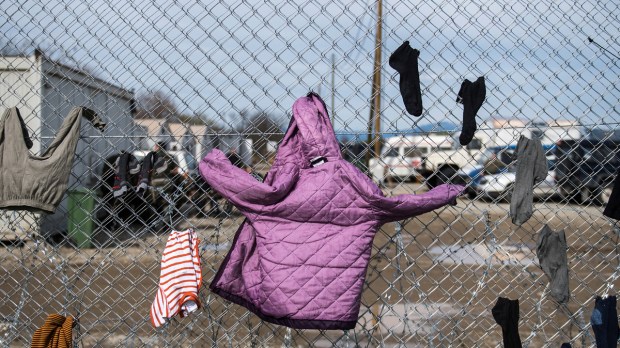Five years after his first visit, Pope Francis will visit Lesbos again on December 5, 2021. Two women agreed to testify about their experience as refugees in Greece, having passed through the Aegean islands, which have become symbols of the migration crisis in the Eastern Mediterranean in recent years,.
Zita is the mother of three children, but she hasn’t seen them since she left Cameroon, which she abandoned because living conditions had become impossible. After a long journey, she first went to Turkey, where she stayed for several months. But “it didn’t go well; I couldn’t find a job,” she explained to I.Media on the phone.
She then tried to reach Europe by inflatable boat. “It was too risky,” she recalls in hushed tones. “We crossed the sea… We arrived in Greece in Samos on October 30, 2019.” For Zita, the island of Samos, about a hundred kilometers south of Lesbos, “is hell; it’s very, very, very difficult to live in that camp.” She stayed there for almost two years, before being transferred on August 30, 2021, to another place an hour from Athens.
Today, the Cameroonian woman lives in a container with three other women, without work and without economic support. “I would give anything to go to another country,” she says on the verge of tears, expressing her distress. “There’s nothing to do in the camps but sleep, sleep, sleep.”
Is Zita a Christian? “Without a doubt,” she answers with conviction. She hopes that the coming of Pope Francis will improve the conditions of the refugees: “In Greece it is so difficult … And those who stayed in Samos say that the new camp is like a prison.”
Sara’s research
In Afghanistan, publications by Sara (not her real name) on the treatment of women in Islam did not go down well. Attacked several times in the street, and threatened, the poet and human rights activist left her country in June 2019. Alone with her four-year-old son, she first went to Iran, then illegally crossed the border with Turkey, at night, in the mountains.
Then began a six-month journey to Greece. “We had to stop five times in boats 9 or 12 yards long, overloaded with about 50 people,” says the young Afghan woman with hesitant English. On the sixth outing, in January 2020, Sara and her son landed in Samos, where they lived for 15 months in a tent camp in a forest.
Having obtained refugee status—but still waiting for papers—she was then transferred to Athens, in a house shared with two other single mothers. The situation remains trying, with no state assistance: “Some refugees have family members who work, but women like us have no help with childcare.”
Sara, who is the daughter of Muslims, but is personally agnostic, sees the Pope’s visit as an event of peace. “The Pope is a man of peace. He transmits this message in his travels,” she believes.
Peace is what Sara is looking for, and she plans to emigrate elsewhere. “I would like to publish my memoirs as a refugee, written in the camps, when my spirit becomes free. We can’t find peace here. If we don’t have good living conditions, we can’t go on… Other countries may have better laws.”
She also expects the Pontiff’s visit to shine the spotlight back on the migration crisis. “I think there was a lot of talk about it at the beginning, but right now people are forgetting about the refugees in Greece.”
~
According to figures from the United Nations Refugee Agency (UNHCR), more than one million migrants have flocked to Greek shores since 2014, and nearly 8,000 since the beginning of 2021.
Recently, the former camps on Samos and Lesbos closed, and their occupants have been transferred to the Greek mainland, to countries in Europe, or to ostensibly more organized camps on these islands.

